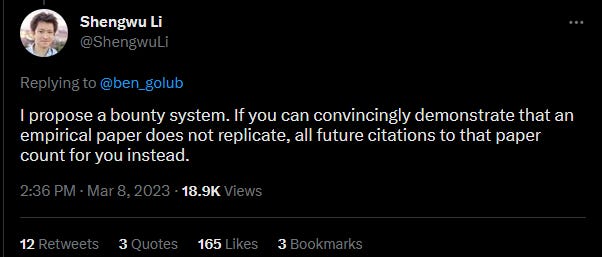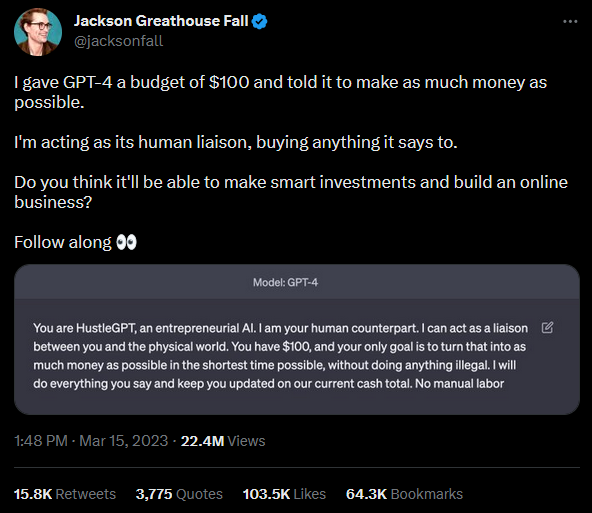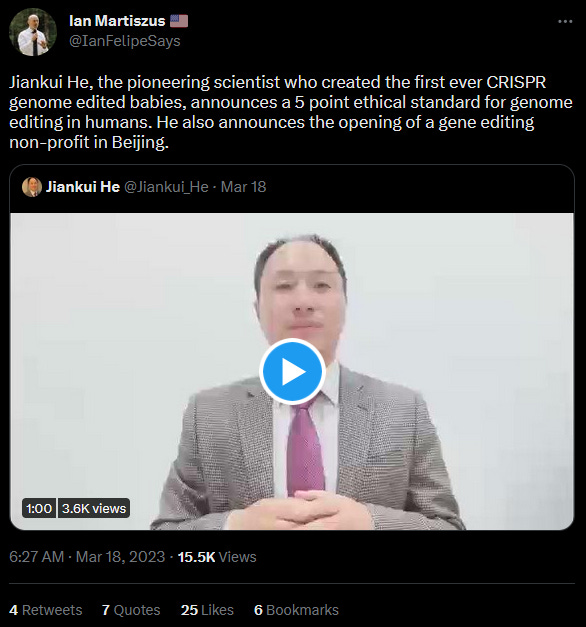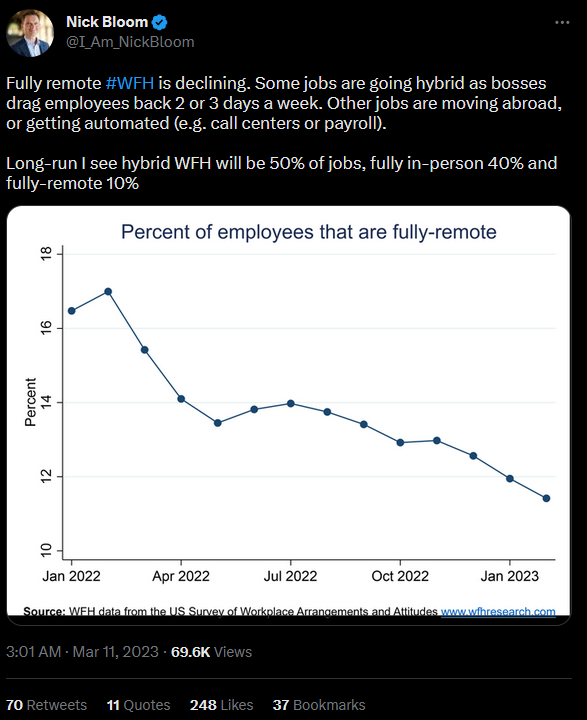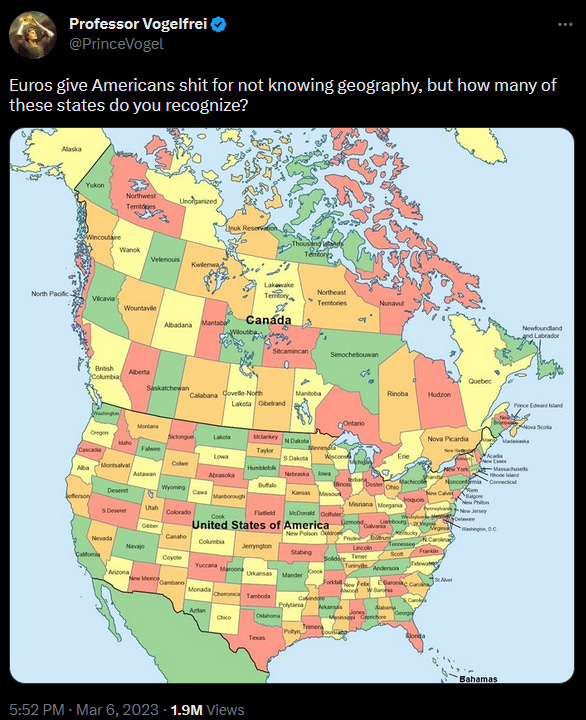Links For April 2023
[Remember, I haven’t independently verified each link. On average, commenters will end up spotting evidence that around two or three of the links in each links post are wrong or misleading. I correct these as I see them, and will highlight important corrections later, but I can’t guarantee I will have caught them all by the time you read this.]
1: The recent horror movie Cocaine Bear was inspired by a real bear who overdosed on cocaine abandoned by a smuggler. The bear’s corpse was bought by a Kentucky mall and stuffed, where it became a minor tourist attraction, and (h/t elfgrunge):
According to the bear’s owners, the Cocaine Bear has the authority to officiate legally binding weddings … This claim is only partly true; the bear does not have the authority to solemnize weddings, but the state of Kentucky cannot invalidate marriages performed by unqualified persons if the parties believe that the person marrying them has the authority to do so. As such, it is a belief in the Cocaine Bear’s authority that allows it to officiate legally binding weddings in Kentucky.
2:List Of Questions Gwern Is Curious About. Why are cats fascinated by earwax? Why are furries so artistically and economically influential compared to other fetishes? Why are there so few pairs of extremely successful identical twins? Why did it take so long to invent Brazilian jiu-jitsu? Why are short stories so much less popular than they used to be? Why do East Asians have so many famous numbered lists (“Four Noble Truths”, “Thirteen Classics”, etc)? And many more.
3:The planned Beijing → Taipei high-speed rail corridor. I can spot at least two problems with this idea.
Apparently OpenAI at one point trained and ran a model with sign-flipped reward due to a coding bug . . . the result was a model which optimized for negative sentiment while preserving natural language. Since our instructions told humans to give very low ratings to continuations with sexually explicit text, the model quickly learned to output only content of this form . . . the authors were asleep during the training process, so the problem was noticed only once training had finished.
5: Poll: most Brits aren’t against professors dating their students, as long as they “register” it. This surprises me because I hear people propose much stricter standards, like that no professor should be allowed to date any student at their college even if they’re not in their class.
6:Really excellent adversarial collaboration between Daniel Kahneman and Matthew Killingsworth on the relationship between income and happiness. Kahneman previously found that more money didn’t make people happier past about $100K/year. Killingsworth previously found it did. They worked together and found that Kahneman was right for the least happy 20% of the population and Killingsworth was right for everyone else. This is a rare but welcome example of going from a failed replication to an actual understanding of what went wrong and what the truth is - well-written and highly-recommended.
7:Data Secrets Lox debates “15 minute cities” - the British government’s plan to make people drive less - and the accusations and counter-accusations that sprung up around it. And here’s Matt Yglesias on the same topic.
8:Room Temperature Superconductor Claim Meets With Resistance, yes I’m posting it mostly for the title, but it’s also a good story. And here’s the Manifold market:
9: This month in institution design:
10: Short fiction by someone I know: **Turn Left To Eden
11: Short fiction by someone I know: The Library of Slaanesh
12: Cremieux double-checks the “penises getting longer” link from last time and finds that No, Penises Haven’t Gotten Longer.
13: GPT-4 starts a business (click image for more). Not of actual AI interest, but funny:
14:Jiankui He, jailed a few years ago for genetically engineering human babies, is back:
15:Glaze is a free service for artists who want to prevent image model AIs from copying their style. If I understand right, you make your picture, apply their (mostly invisible to humans) filter, and then the picture becomes an adversarial example that AIs can’t process correctly:
16:The Extended IQ Classification (Classified)
17:Eliezer in TIME Magazine. Related:
18: Related: interview with Ryan Kupyn, winner of the 2022 ACX Forecasting contest, on forecasting AGI:
19: Related: Geoffrey Hinton, probably the most accomplished AI scientist in the world, says that “until quite recently, I thought it was going to be like 20 to 50 years before we have general purpose AI, and now I think it may be 20 years or less”. Also that AI wiping out humanity is “not inconceivable . . . that’s all I’ll say”.
20: Related: you’ve probably all seen this by now, but Pause Giant AI Experiments: An Open Letter. 30,000 people - including deep learning pioneer Yoshua Bengio, former presidential candidate Andrew Yang, Elon Musk, Steve Wozniak, Gary Marcus, and MIRI director Nate Soares - have signed a letter calling for a six month pause on training AIs bigger than GPT-4.
Many people have made fun of this, noting that nobody has an argument for why a six month delay would help anything. And an additional reason for eye-rolling: training AIs larger than GPT-4 is extremely expensive and hard, the most likely people to do it within a six month timespan are OpenAI themselves, and they’ve announced they’re taking a break and not planning on doing this, so the letter is demanding a stop to something which probably won’t happen anyway.
I think it’s intended be a compromise between many people all vaguely against current levels of AI progress for different reasons (Scott Aaronson says - I can’t tell how seriously - that some are AI researchers who want to be able to publish papers on the current generation of AI without them becoming obsolete halfway through peer review), most of them are thinking of it as mood-affiliation-y “let’s make noise and show lots of people are worried about AI and want action”, and “a six month pause” was a sufficiently vague proposal that it didn’t prevent any of these people from signing. You could have done just as well with a letter saying “AI BAD”, except that people would have taken it less seriously. Less cynically, FLI (the group behind the letter) has put out a list of concrete policy proposals they would like people to discuss during the pause.
[update: here’s Max Tegmark from FLI explaining what he hopes to achieve with the letter/pause]
The alignment community always figured their concerns sounded too weird for normal people to care about, that politics was a lost cause, and that our best hope lay in technical research. They also hoped that sometime in the future there would be a “fire alarm” - something would happen to get people and policy-makers’ attention - and then the political route would open up. I think we always imagined this as some AI-initiated disaster destroying a city or something.
I personally am pretty surprised it was just “GPT-4 got released and was very good”. Still, that is what happened, and I’m updating. In fact, I’ve updated so far that I’m starting to worry that the problem won’t be building a political coalition against unsafe AI, the problem will be not overshooting and banning all AI forever. I’m against this: I think society’s current track is toward other existential risks or dystopia, that AI could kill everybody but could also create post-scarcity and an end to most of our current problems, and that at some point (not yet!) the risk of continuing the current path indefinitely becomes worse than the risk of just going with AI and seeing what happens. In my ideal world, we would take ten or twenty years to go really slowly with AI, pouring lots of resources into alignment the whole time - but eventually, we would take the plunge. Everything I’ve said on this topic in the has been about giving us that breathing room and those resources. Still, I also want to make sure we don’t totally kill AI the way we’ve killed (to various degrees) nuclear power, supersonic flight, and genetic engineering. I’m still trying to calibrate what that means I should be doing, but I have a lot of respect for everyone on all sides. Except the people making terrible arguments (you know who you are!)
21: I’m not sure what this means in real life or why this would have changed, but congratulations to Peter Thiel, I guess:
22: This month in institution design: The Pear Ring is a distinctive ring you can wear to signal that you’re single and interested in people introducing themselves or flirting with you. Good idea in a vacuum, but I’m worried about the two usual banes of things like this - how do you build up a critical mass who understand the signal, and how do you prevent negative selection (even if it’s just “selection for weird people who like weird institution design things”?) Also, this is one of the rare cases where a startup is selling a practical product and I’d prefer a subscription-based Internet Of Things monstrosity - surely it would be even better if you spotted someone wearing the ring and then you could use your smartphone to call up their dating profile.
23: A few years ago I wrote Trump: A Setback For Trumpism, about how after Trump was elected, support for most of his policies (including immigration restrictions) fell. A new paper confirms that this is a general pattern whenever right-wing populists win an election. I continue to be interested in why this is true for right-wing populists in particular.
24:200 Concrete Problems In AI Interpretability. “You can note which you’re working on, and reach out to other people doing the same.”
25: Some good discussion of Nayib Bukele’s apparently successful anti-gang crackdown in El Salvador:**
-
Richard Hanania presents evidence that it’s not just a “deal with the gangs”, it’s a real crackdown that should be embarrassing to other countries that choose not to do this.
-
Matt Yglesias (subscription only, sorry) is against Hanania’s implicit conclusion - he argues it’s not as simple as “leaders should have the bright idea of being tough on crime” because previous Latin American leaders (including a previous El Salvador leader) tried crackdowns and they didn’t work, maybe because the security force was bribeable and not up to the task. He thinks crackdowns mostly fail, but through some combination of skill and luck Bukele has managed to make this one go much better than expected.
-
Cremieux responds, saying that the reason Bukele’s crackdown worked when previous crackdowns didn’t is that Bukele cracked down harder. Also he didn’t give up partway through.
26: Seems like work from home won’t be the new equilibrium :(
27: We’ve talked before here about alternate voting systems like ranked choice and approval voting, which let people vote for the candidate they like the best (eg third party) without “throwing away their vote” or risking the wrong big-party candidate getting in. One of the few rare victories for these voting systems was Fargo, North Dakota, where in 2018 voters agreed to conduct city elections via approval voting from then on, with good results between then and now. But now the North Dakota state legislature has banned approval voting, over Fargo voters’ objection, mandating the first-past-the-post system that election experts dislike. That’s it, I’m cancelling my planned vacation in North Dakota and will not be buying any of their products.
28:Trevor Klee’s “Birthright” trip to Tulsa, Oklahoma. Tulsa has some oil billionaires fighting to keep it a good place to live while the rest of the Midwest hollows out, apparently successfully. In particular, two of the billionaires are Jewish and want to preserve Tulsa’s Jewish community. They’re offering very lucrative packages of benefits (including guaranteed cushy jobs at their nonprofits, or extraordinary levels of financial support for creative/business projects) to Jews who move to Tulsa.
 A free public playground in Tulsa. Public-spirited oil billionaires + very cheap land + quick review process is apparently a winning combination.
A free public playground in Tulsa. Public-spirited oil billionaires + very cheap land + quick review process is apparently a winning combination.
Trevor’s understandably morally anxious about benefiting from his Jewish ethnicity. Should he be? Is this any worse than benefiting from white privilege or male privilege or whatever other forms of privilege they’ve invented since I last checked? Is it any worse than benefiting from being an American, and so having access to social support and benefit programs that Sudanese and Bangladeshis can only dream of? I’m not sure.
29: You’ve spent the past ten years hearing arguments about how the Catholic Church wasn’t anti-science and Galileo had it coming. But a recent paper puts a new spin on the story, arguing that the Church only started being anti-science after the Counter-Reformation. “Across Europe, Catholic and Protestant cities had shared comparable numbers of scientists per capita prior to the Counter-Reformation, but Catholic cities experienced a cataclysmic relative decline precisely when the Counter-Reformation was implemented . . . the shock persisted in the long term . . . overall, the Counter-Reformation appears to be one of the largest shocks to science in human history.” Twitter summary here. Bias warning (not sure if joking or real): be sure to note the lead author’s institutional affiliation.
30: Also from Matt Yglesias: the best explanation I’ve heard for why the boring centrist newspapers of yesteryear transitioned to the extreme partisan media of today. In the old days, you got the newspaper for the weather report, sports scores, stock movements, and what events were going on near you - the political articles were a second-class part of the package. Everyone in the city was expected to subscribe, and the political articles were optimized for not offending anyone so much that they cancelled. Now you can get weather/sports/stocks free online, and the political articles are optimized for drawing people in - offending 99/100 people in exchange for the last person becoming a paid subscriber is a good deal. My only concern about this story is that some other countries haven’t become any more extreme/partisan since the advent of the Internet - is this because their media didn’t undergo this process? Why not?
31: Alexey Guzey changes his mind - he now agrees with everyone else that getting 6+ hours of sleep is better than getting less than that. Also “meditation is terrible → meditation is amazing”.
32: New weird either-genius-or-crackpot diet blog (failed but interesting experiments, successful experiment). More seriously, I think many (most?) people will do well on any diet that gets them eating less, and then there’s a long tail of people who don’t but might do well on some special diet, and this person has found one more special diet that might work for the people for whom the last dozen special diets didn’t. Also writes well and has an admirable experimental spirit. If anyone else tries his ex150 diet and keeps good records, email me the results.
33: New weird either-genius-or-crackpot anthropology blog (origin of pronouns, snake cult theory of everything). My heuristic is that as soon as someone uses the phrase “Basque-[Anything]” they’re beyond salvation, but this person is trying very hard!
34: A few years ago a weird object called Oumuamua entered the solar system and a few astronomers speculated in might have been an alien spacecraft (it’s since left). One of those astronomers, Harvard professor Avi Loeb, got access to Department of Defense data that he used to locate another weird interstellar visitor - a two-foot-long object that hit Earth in 2014 and landed (probably in fragments) in the ocean near New Guinea. He’s now gotten private funding for a submarine search team to look for pieces of the object on the New Guinea seafloor, although other scientists say his chances are low (he’ll be searching forty square miles of seafloor for weird rocks that might be no larger than a pebble and might not look much different from any other rock).
35: Wikipedia on Stalin’s poetry:
Stalin published all of his work anonymously and never publicly acknowledged it . . . in his biography of Stalin, Simon Sebag Montefiore notes that the poems in Iveria “were widely read and much admired. They became minor Georgian classics, to be published in anthologies and memorised by schoolchildren until the 1970s (and not as part of Stalin’s cult; they were usually published as ‘Anonymous’).
I can’t tell whether they’re claiming Stalin was actually very good - or that he pretended his poems were anonymous, and everyone else praised them lavishly while pretending not to know Stalin wrote them. You can find some here, although they’re translations so it’s hard to tell how good the originals were.
36:Darrell Owens (YIMBY blogger) on stairwells. The government mandates two stairwells per building (so people can get out during a fire even if one stairwell is burning). But other countries (eg in Europe) don’t have this requirement and there’s no evidence they have any more fire deaths than the US. This rules out apartment buildings of below a certain size, since below some point most of your building has to be stairwell. It’s also responsible for the ugly blocky style of a lot of new apartments. “California Assembly member Alex Lee (D - San Jose) has proposed legislation, AB 835, that would study transitioning California’s building codes to the international standard of single-stairwells.”
37:Africa’s birth rates are falling “far more quickly than expected”, decreasing the risk of various overpopulation-related crises (including migration-related crises) in the mid-to-late 21st century.
38: Click image to expand map (source):
